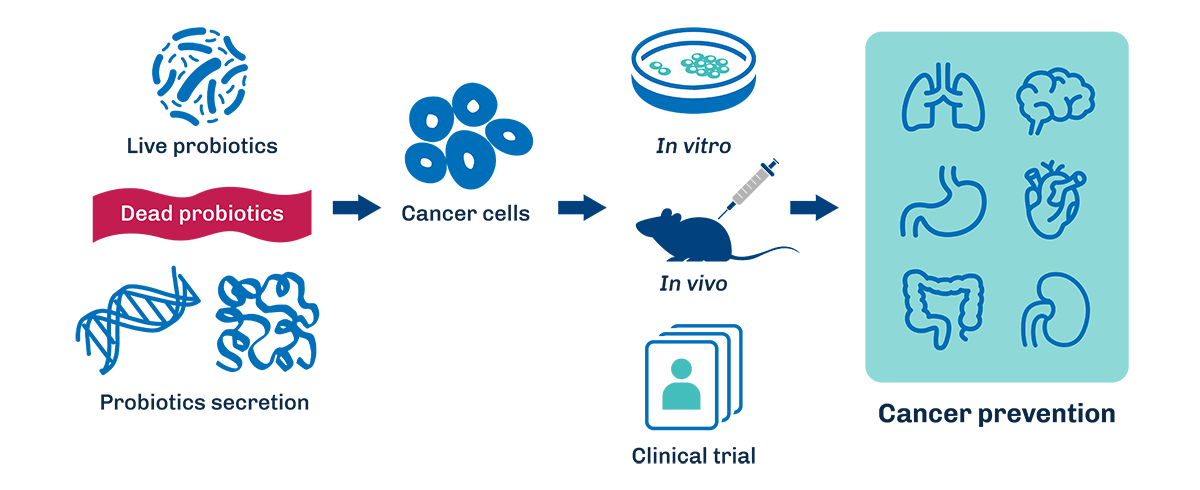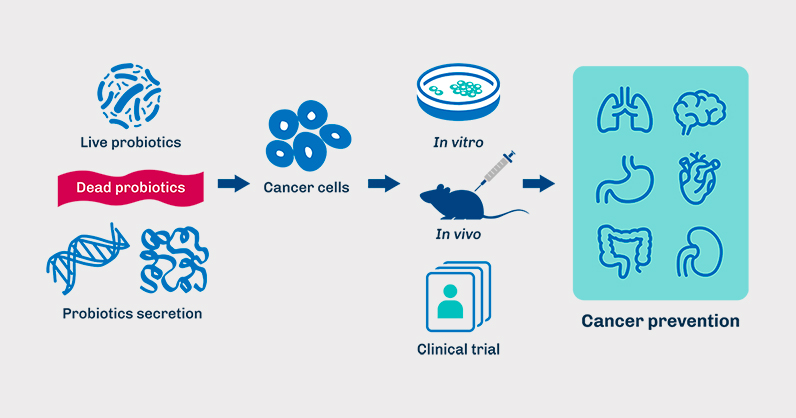The composition of our intestinal microbiota, may be a measure of our overall health. The presence of an imbalance in the microbial gut community is usually associated with health problems (dysbiosis). Changes in the composition of microbes in the gut have been identified as a key factor in the increasing occurrence of gastrointestinal (GI) disorders. In contrast, good bacteria (probiotics) have gained a lot of attention in terms of their efficacy in the prevention and treatment of GI disorders.
How do the good bacteria defeat the bad bacteria?
There are three mechanisms by which probiotics help our gut be in good shape. First, they compete with other gut microbes for nutrients and space which eventually slows down the growth of bad bacteria, reduces their number, and ultimately reduces their pathogenic potential.
Second, probiotics release antimicrobial compounds such as bacteriocins, organic acids, and short-chain fatty acids. These chemicals make the GI environment unfavorable to microbes, inhibiting microbial growth and inactivating toxins from these microbes.
Lastly, they stimulate and control the immune system. Probiotics, despite being good bacteria, are still foreign to the host. Upon entering, they interact with the host’s immune cells which induces processes such as T lymphocyte activation, cytokine generation, phagocytosis induction, and stimulation of IgA antibody secretion. Essentially, the probiotics trigger the host to produce defensive substances against foreign substances. This changes the overall profile of pro- and anti-inflammatory cytokines which leads to the inactivation of harmful microbes and their toxins.
How does L. reuteri affect GI disorders?
For a probiotic strain to affect gut health, it must be able to adhere to the human GI tract for colonization, interaction with host cells, pathogen suppression, and epithelial cell protection or immunological modulation. Limosilactobacillus reuteri or Lactobacillus reuteri (L. reuteri) is a type of probiotic ("good" bacteria) normally found in the digestive tract. It is one of the most widely studied organisms in children and adults with GI disorders partly because of its ability to colonize and adhere to mucin and intestinal epithelial cells. Additionally, it inhibits pathogenic microbes by producing antimicrobial compounds such as lactic acid, acetic acid, ethanol, reuterin, reutericyclin, and histamine. The production of these substances ultimately enhances the production of anti-inflammatory cytokines and modulates the gut microbiota.
L.reuteri as a treatment for Gastric Cancer
A well-known causative agent for GI disorders such as gastric and duodenal ulcers is the gram-negative bacterium called Helicobacter pylori (H.pylori). This same bacterium is also thought to be a primary cause of gastric cancer. However, the acidity of the stomach makes it hard for the immune cells to efficiently eradicate the bacteria. The worldwide problem of antibiotic resistance also reduces the efficiency of using antimicrobial agents. Hence, microbiome modulation has become a wide area of research in the treatment of stomach cancer.

L.reuteri is able to survive the gastric acid environment and bile and to colonize the gastric mucosa. it has been reported that L. reuteri acts by contending with H. pylori for glycolipid receptors binding, then suppressing its growth. Its ability to secrete antimicrobial agents reuterin and reutericyclin have also been found to strongly inhibit the growth of H.pylori.
Conclusions
Over the years, the abundance of L. reuteri has significantly decreased accompanied by an increase in inflammatory disorders. Nevertheless, its ability to secrete bacteriocins and its acidiphilic nature makes it beneficial for our overall gut health by improving dysbiosis. Lastly, treatment of other diseases such as obesity, glucose homeostasis, inflammatory bowel disease, hepatic diseases, and cystic fibrosis are all associated with various strains of L. reuteri.
References:
- Abuqwider J, Altamimi M, Mauriello G. Limosilactobacillus reuteri in Health and Disease. Microorganisms. 2022 Feb 28;10(3):522. doi: 10.3390/microorganisms10030522. PMID: 35336098; PMCID: PMC8953724.
- Lebeer S., Vanderleyden J., De Keersmaecker S.C.J. Genes and Molecules of Lactobacilli Supporting Probiotic Action. Microbiol. Mol. Biol. Rev. 2008;72:728–764. doi: 10.1128/MMBR.00017-08.
- Dargenio C, Dargenio VN, Bizzoco F, Indrio F, Francavilla R, Cristofori F. Limosilactobacillus reuteri Strains as Adjuvants in the Management of Helicobacter pylori Infection. Medicina (Kaunas). 2021 Jul 20;57(7):733. doi: 10.3390/medicina57070733. PMID: 34357014; PMCID: PMC8306855.
- Bell HN, Rebernick RJ, Goyert J, Singhal R, Kuljanin M, Kerk SA, Huang W, Das NK, Andren A, Solanki S, Miller SL, Todd PK, Fearon ER, Lyssiotis CA, Gygi SP, Mancias JD, Shah YM. Reuterin in the healthy gut microbiome suppresses colorectal cancer growth through altering redox balance. Cancer Cell. 2022 Feb 14;40(2):185-200.e6. doi: 10.1016/j.ccell.2021.12.001. Epub 2021 Dec 23. PMID: 34951957; PMCID: PMC8847337.
- https://www.cancer.gov/about-cancer/causes-prevention/risk/infectious-agents/h-pylori-fact-sheet



